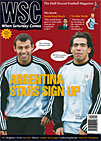 Tom Davies updates us on clubs in crisis
Tom Davies updates us on clubs in crisis
The inner workings of Peterborough United have been laid bare by Sky’s Big Ron Manager series, in which the discredited ex-pundit was brought in to “advise” then caretaker-manager Steve Bleasdale as the team challenged for last season’s play-offs – their form collapsed. This dirty laundry-airing exercise is the latest in a string of developments that has left supporters exasperated with Barry Fry after nine years of declining playing fortunes and attendances since he arrived, first as manager then as chairman.
Of more concern is the redevelopment of London Road. Plans to develop the Moys End of the ground with a 1,934-seat stand and 135 flats in the adjoining car park go before Peterborough City Council later this month, but supporters want the scheme revised so that the club actually reap some benefit from the residential development.
Revenue from it will go not to the club but to Peterborough United Holdings Limited, which was set up under the control of Fry’s property-developer friend Colin Hill in 2003, when Fry bought the team side of the club. PUHL took control of the land and car park – leasing it back to the club for a peppercorn rent – as well as around £3.5 million worth of debt, which could be offset by future property values. Clubs do hive off bits of land to raise revenue when rebuilding, but Posh stand to gain nothing from the Moys End scheme.
The Posh Trust wants the plans, which it supports in principle, amended to include funding of a centre of excellence, to safeguard elderly and disabled parking facilities and to include more community amenities. Fry has responded by accusing the trust of jeopardising the scheme, while Football League chairman and Posh fan Brian Mawhinney nailed his colours to the mast by resigning as patron of the trust, claiming that its attitude to the proposals had been “unhelpful”. Once again, separation of team and ground ownership has left a club looking vulnerable.
Conference side Crawley Town survived a winding-up threat last month, but still need to settle their outstanding debt and ownership issues before the end of October, when a company voluntary arrangement expires.
The Majeed brothers, Chas and Azwar, bought the club in June 2005 for around £547,000, but problems soon emerged. Bills and players went unpaid as fans speculated on the level of assets the brothers’ company, the SA Retail Group, actually possessed. By March the Majeeds said they could not afford to pay players and three months later they took the club into administration, incurring a ten-point penalty for this season. That Chas Majeed had been discovered to be a declared bankrupt didn’t help (as a result, Chas no longer holds any official position at the club; Azwar was chairman until standing down in August and replaced by Sue Todman).
With liquidation looming, creditors last month agreed to accept 50p in the pound as part of a CVA – chief among them are the players, claiming almost £400,000, and the Inland Revenue, owed £236,000. The Majeeds claim £700,000 is due to their own SA Group, as well as £100,000 to two other companies to which they are connected.
All of which complicates attempts to wrest control from the brothers: around £500,000 is needed by next month’s deadline, but prospective new owners would need to pay off the Majeeds on top of this. The supporters’ trust has been in talks with three interested parties about a takeover, and the administrator will reconvene a creditors’ meeting on October 29, which is the deadline for the agreed debts to be settled and at which they will have an opportunity to assess offers for the club.
An air of nervous stability now hangs over Queens Park Rangers after a recent past characterised by administration, takeovers and, most recently, criminal proceedings that ended in the acquittal of seven men accused of threatening director Gianni Paladini to quit at gunpoint in August last year. Paladini now runs the club as chairman alongside his main associates, the former agent and main investor Antonio Caliendo, and Italian businessman Franco Zanotti. Paladini’s effective ousting of former chairman Bill Power last year – with assistance from Dunga, who was part of Paladini’s team before he left to coach Brazil – caused some disquiet, as, obviously, did the court case. Caliendo is thought to be the prime mover behind the two main companies with substantial stakes in QPR – Barnaby and Wanlock – but rumours have circulated that he may be considering quitting.
QPR are still in considerable debt and saddled with a punitive high-interest £10m loan negotiated in 2002 by administrators, on behalf of former chairman Chris Wright, with the shadowy Panama-registered ABC Corporation, whose past involvement with Derby was covered in WSC 229. The next major task for the club is to get their finances in order by April next year, the halfway point of the loan repayment period, at which point they can exercise a clause to renegotiate it with another lender. With supporters establishing their own fund-raising initiatives, their need for transparency in their dealings with the current board, about whom fans’ opinions are split, is obvious.
From WSC 236 October 2006. What was happening this month